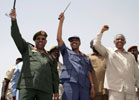
The International Criminal Court, or ICC, has issued an arrest warrant for Sudan’s President, Omar al-Bashir, on charges of crimes against humanity and war crimes. This is good news. There was never any doubt that the wholesale attacks in Darfur against civilians carried out by janjaweed militias were directed and engineered from the presidential palace in Khartoum, and the court in many ways has only acknowledged the obvious.

